Navigating the ever-rising costs of living can be challenging, but one of the most accessible areas for cost-cutting is your utility bills. In this article, we’re going to delve into 10 effective strategies that can help you reduce your utility expenses and contribute to a more energy-efficient home.
Let’s get started.
Mind the Thermostat
Heating and cooling account for a significant portion of your utility bill. Simply adjusting your thermostat by a few degrees can lead to noticeable savings.
During winter, we highly recommend that you set the thermostat to 68 degrees Fahrenheit while you’re awake and lower it while you’re asleep or away from home. In the summer, keep it at 78 degrees when you’re home and higher when you’re away to conserve energy.
Moreover, you want to invest in programmable thermostats, as they automatically adjust the temperature based on the time of day to ensure comfort while minimizing energy use.
Seal and Insulate
Insulation is key to maintaining your home’s temperature. Inspect your home for drafts, especially around windows, doors, and electrical outlets. Simple fixes like applying weather stripping, caulking gaps, and adding insulation to attics and crawl spaces can make a significant difference.
Proper insulation helps maintain your home’s temperature, reducing the strain on your heating and cooling systems and consequently lowering your energy bills.
Energy-Efficient Appliances
Replacing old appliances with energy-efficient models can lead to substantial savings. Appliances with the ENERGY STAR label, for example, are certified to be more efficient.
While these appliances might have a higher initial cost, they consume less energy, which translates to lower utility bills over time.
Consider the long-term savings when purchasing appliances like refrigerators, dishwashers, and washing machines.
Smart Water Usage
Water conservation is crucial for reducing utility bills. Simple acts like fixing leaky faucets, installing low-flow showerheads, and using efficient watering systems for your garden can make a big difference.
Also, reducing your shower time and turning off the tap while brushing your teeth can significantly lower water usage. If possible, collect rainwater for gardening to further decrease your water bill.
Use LED Lighting
Switching to LED bulbs is one of the easiest and most cost-effective changes you can make. LEDs consume up to 75% less energy and last 25 times longer than incandescent bulbs. This not only reduces the amount of energy your home uses but also decreases the frequency of bulb replacements. Consider replacing your most used lights first for immediate savings.
Unplug Electronics
Many electronics consume power even when turned off, a phenomenon known as phantom load.
By unplugging devices like TVs, computers, and chargers when not in use, or using a smart power strip, you can cut down on unnecessary power usage. This simple habit can lead to noticeable reductions in your electricity bill.
Optimize Laundry Practices
Laundry is a significant energy consumer. Washing clothes in cold water can save up to 90% of the energy required to heat the water. Also, air-drying clothes instead of using a dryer not only conserves energy but also extends the life of your clothing.
When you do use the dryer, cleaning the lint trap after every load improves efficiency.
Manage Your Fridge and Freezer
Your refrigerator and freezer are constantly running, making them significant energy users. Ensuring they’re not overly packed and allowing air to circulate can improve efficiency.
Regularly defrosting and cleaning the coils can also help them run more effectively. Be mindful of keeping the door open for shorter periods to maintain the internal temperature.
Install Energy-Efficient Windows
Upgrading to double-pane windows provides better insulation, keeping your home warmer in winter and cooler in summer. This reduces the reliance on heating and cooling systems, leading to lower energy bills.
Additionally, modern windows often come with UV filters, which protect your furnishings from sun damage and improve indoor comfort.
Solar Panels
For a long-term investment, solar panels can offer significant savings. While the upfront cost can be high, the long-term savings are substantial, and many regions offer tax incentives or rebates for solar panel installation.
Solar energy reduces your reliance on grid electricity and can significantly lower your electricity bills. Plus, it’s a sustainable energy source, reducing your environmental footprint.
By implementing these strategies, you can not only enjoy lower utility bills but also contribute to a more sustainable and energy-efficient future. Remember, every small change counts and can lead to substantial savings over time.

